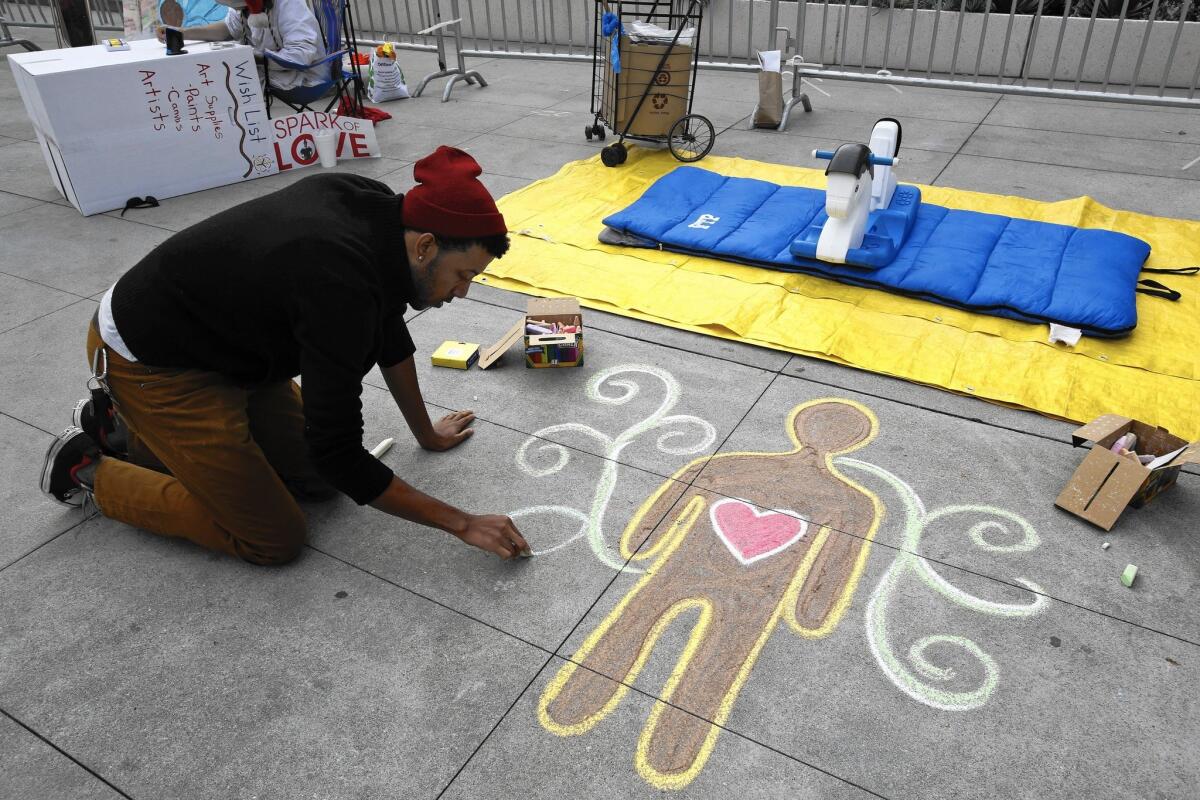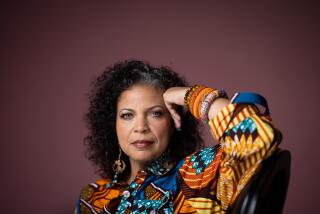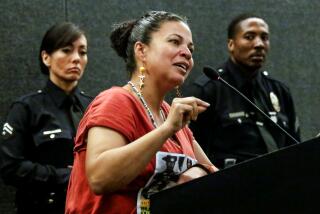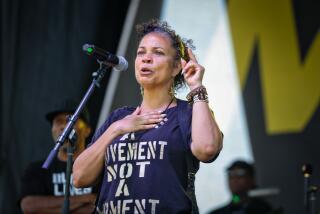Young activists emphasize that black lives have to matter to all

- Share via
There was plenty to do Sunday to get her three children ready to return to school this week. But Melina Abdullah chose to spend that rainy day with her daughter and two sons camped out on the sidewalk outside the Los Angeles Police Department’s headquarters.
Her family has shown up there almost every day for the last two weeks, joining dozens of others who want LAPD Chief Charlie Beck to fire the officers involved in the death last summer of Ezell Ford, a young black man shot and killed by police.
“Black Lives Matter” is the theme of the protesters’ signs and sidewalk chalk drawings. It’s more to them than a rallying cry or Twitter hashtag.
“I’m here because I’m a mother,” Abdullah told me Sunday as her children tossed a ball on the covered patio outside the police station. She remembers growing up in Oakland at a time when every mom on the block looked out for everyone else’s children. “There was a shared sense of responsibility to protect them. We need that now,” she said.
A college professor, Abdullah heads the Pan-African Studies department at Cal State L.A. Her children — 4, 8 and 11 — have already learned to believe that their skin color is a hazard. “I have a target on my back everywhere I go to,” 11-year-old Thandiwe Abdullah told The Times last week.
Which may seem like paranoia, until you think about the 12-year-old boy shot to death by a Cleveland police officer as he played in the park with a toy gun.
::
There weren’t many people at the protest site when I visited last weekend. Their provisions on the sidewalk — bins of food, water, toys, cooking supplies — were covered with blue tarps, and the writing on their signs had been smeared by the rain.
It felt more like family camp than the unruly, combustible gathering it had been the week before. Sunday began with prayer and a “spiritual circle” and wound down with group meditation. There were a few mothers, several kids and an in-and-out procession of earnest young adults.
Abdullah called the protest “a very organic movement” that’s loosely tied to the national Black Lives Matter campaign, which has included a “die-in” by young lawyers in Los Angeles and protests at restaurants in Oakland.
It’s a movement driven not by civil rights stalwarts, but by young people angry at the bias they see in the criminal justice system and frustrated by the glacial pace of change.
“It resonates with young people because a lot of us have been through that — stopped by police for no reason,” said Chris Haynes, 27, a former student of Abdullah’s who stopped by the protest Sunday on his way home from church.
Years ago in San Mateo, he was pulled off a bus he’d just boarded and handcuffed by police, who eventually released him without explanation or apology. “I’d been just sitting at the bus stop reading a book,” Haynes said.
He was lucky that other officers nearby could vouch for him — because he worked with them on a department store security team.
“I was very, very angry for a while,” he said. “This gives me a place to have a voice.”
::
The protesters are learning that the path toward change is neither tidy nor smooth.
In Los Angeles, the lack of structure has spawned competing protests and led to clashes over tactics and whose voices should be heard. That may just be the healthy evolution of local activism, in a black community with lots of factions and little real leadership.
“It’s kind of hard for me to sit around and not do anything,” said Sha Dixon, the mother of a 10-year-old boy, who said she wants “revolution, not reform.” She’d also like a little cooperation from her elders.
“This may be led by us millennials, but to be effective we really need assistance,” she said. Dixon thought it would be easy to get an audience with Beck, after days of heated demands.
“But when we asked, they kind of laughed at us,” she said. Then LAPD officers arrested Sha and Abdullah for trespassing.
The meeting didn’t happen until a seasoned politician intervened.
Haynes considers that a victory and a lesson. For him the protests have provided a real-life answer for a rhetorical question Abdullah once asked in class:
Are you for individualism or being a community?
“That question stayed with me,” Haynes said. For him, it’s not just about making the LAPD change, but rekindling a collective spirit among black people. Black lives have to matter not just to the police, but to each other too.
“Black lives have value when you’ve been taught to value one another,” he said. “If not, you can easily kill each other. Your life has no value, and neither does theirs.”
Twitter: @SandyBanksLAT
More to Read
Sign up for Essential California
The most important California stories and recommendations in your inbox every morning.
You may occasionally receive promotional content from the Los Angeles Times.














